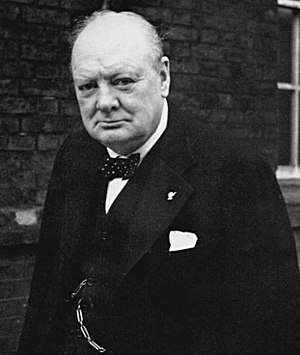Moscow Conference (1944)
The Fourth Moscow Conference,[1] also Tolstoy Conference for its code name Tolstoy, was a meeting in Moscow between Churchill and Stalin from October 9 to October 19, 1944.
Churchill made a secret proposal on a scrap of paper dividing post-war Europe into Western and Soviet spheres of influence, as follows: recognition of Soviet interests in Poland; the Soviet Union would control 90% of Romania and 75% of Hungary and Bulgaria; the West would control 90% of Greece; Yugoslavia would be split 50-50. Stalin examined the scrap of paper and pondered it for a moment, then wrote a large check in blue pencil and handed it back to Churchill. Churchill commented: "Might it not be thought rather cynical if it seemed we had disposed of such issues, so fateful to millions of people, in such an offhand manner? Let us burn the paper." Stalin counseled, however, to save the historic scrap of paper. Churchill called the scrap of paper a "naughty document,"[2] which came to be known as the "Percentages agreement." There were no Americans present and Churchill did not tell any Americans about the percentages proposal. Harriman was not present but later heard about it from the Soviets. The U.S. never indicated agreement with it. The proposed percentage division was never mentioned at Yalta or other meetings.[3] Leffler states that it "confirmed that Eastern Europe, initially at least, would lie within the sphere of influence of the Soviet Union." [4] However British historian Andrew Roberts states:
- the Second Moscow Conference was not able to resolve major issues and Eastern Europe, and when Churchill did complete his percentages deal with Stalin, it was not ratified by the Americans.[5]
Stalin agreed that the Soviet Union will enter war against Japan, and the British agreed to return to the Soviet Union all former Soviet citizens who had been liberated from the Germans.[6]
Representatives present
The chief representatives for the Soviet Union at the conference were Joseph Stalin, the Soviet leader, and Vyacheslav Molotov the Soviet foreign minister. The United Kingdom principal representatives were Winston Churchill, the British Prime Minister and the British Foreign Secretary Anthony Eden. The United Kingdom CIGS, Field Marshal Sir Alan Brooke was also present as were the United States ambassador to Moscow, Averell Harriman, and General John R. Deane, head of the United States Military Mission in Moscow as observers. Also at the conference were delegations from both the London-based Polish government in Exile and Provisional Polish communist government based in Lublin.[7][8]
See also
References
- ↑ Some British sources call this the Second Moscow Conference as it was the second time Churchill and Stalin had met at a conference in Moscow. The previous time was for the 1942 Conference (see Fact File : Second Moscow Conference 9 to 19 October 1944 Archived 20 August 2010 at the Wayback Machine. BBC)
- ↑ "The Untold History of the United States," Stone, Oliver and Kuznick, Peter (Gallery Books, 2012), page 114, citing "The Second World War Triumph and Tragedy," Churchill, Winston, 1953, pages 227-228, and "Modern Times: The World from the Twenties to the Nineties, Johnson, Paul (New York: Perennial, 2001), page 434
- ↑ Siracusa, "The Night Stalin and Churchill Divided Europe: The View from Washington".
- ↑ Melvyn Leffler, Cambridge History of the Cold War: Volume 1 (Cambridge University Press, 2012), p. 175
- ↑ Andrew Roberts (2009). Masters and Commanders: The Military Geniuses Who Led The West To Victory In World War II. p. 527.
- ↑ Tolstoy, Nikolai. The Secret Betrayal. Charles Scribner' Sons (1977). p. 75. ISBN 0-684-15635-0.
- ↑ Fact File : Second Moscow Conference 9 to 19 October 1944 Archived 20 August 2010 at the Wayback Machine. BBC
- ↑ Stanly Smith Part 1: The Polish Government: Could Churchill have done more to save Poland from Communism?
Further reading
- Resis, Albert. "The Churchill-Stalin Secret 'Percentages' Agreement on the Balkans, Moscow, October 1944." American Historical Review 83.2 (1978): 368-387. online
- Siracusa, Joseph M. "The Meaning of TOLSTOY: Churchill, Stalin, And The Balkans Moscow, October 1944." Diplomatic History 3#4 (1979): 443-444. includes British minutes; online
- Siracusa, Joseph M. "The Night Stalin and Churchill Divided Europe: The View from Washington." Review of Politics 43#3 (1981): 381-409. online
